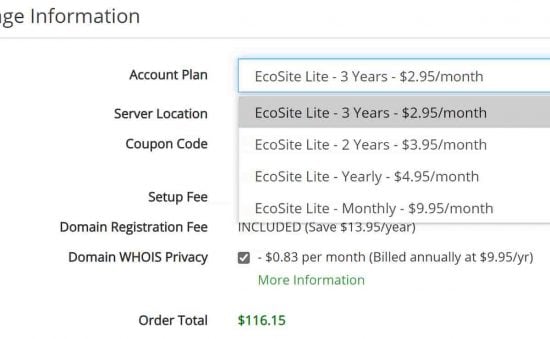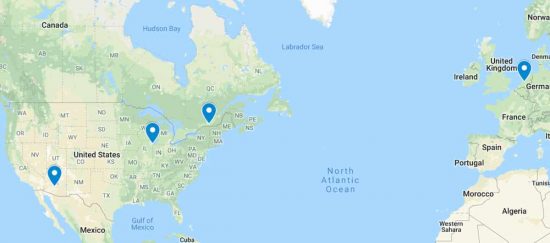This is the GreenGeeks coupon code for their hosting package with a 75% discount.
Disclaimer: Your clicks fund my private luxury island in the Bahamas 🙂
And here is the full list of prices and discounts available right now.
GreenGeeks Coupons(Click Below)🡇 |
Old Price ($) | Discount Amount (%) | |
|---|---|---|---|
| Lite | $2.95/Mo + Free Domain | $11.95/Mo | 75% |
| Pro | $4.95/Mo + Free Domain | $16.95/Mo | 71% |
| Premium | $8.95/Mo + Free Domain | $26.95/Mo | 67% |
Rating: ★★★★
As you can see, GreenGeeks has very high discounts, starting at just $2.95/m, with a free domain. This makes it one of the most attractive hosting options when purchased for 3 years.
Table of Contents:
Best GreenGeeks Coupon Code
If you need to make a quick decision, here’s the best deal you can get on GreenGeeks right now:
The WordPress plan is priced the same but with a few differences. Read more below to find out.
GreenGeeks Coupon Code vs Other Web Hosts
Here’s how GreenGeeks’ pricing compares with other web hosts:
| Web Host | Highest Discount Coupon | |
|---|---|---|
| GreenGeeks | $2.95/m | |
| Hostgator | $2.57/m | Link to Hostgator Coupons |
| InMotion | $2.49 /m | Link to InMotion coupon |
| Bluehost | $2.95/m | Link to Bluehost coupon |
| NameHero | $1.34/m | Link to NameHero coupon |
| HostArmada | $2.99/m | Link to HostArmada coupon |
| A2 Hosting | $2.99/m | Link to A2 Hosting coupon |
As you can see, the GreenGeeks coupon code is very competitive.
GreenGeeks Coupon vs Hostgator Coupon Codes
As you can see from the table above, the initial discount of GreenGeeks is higher than that of Hostgator. However, the problem comes when you try and renew your hosting.
GreenGeeks’ renewal prices are much higher than those of Hostgator’s.
GreenGeeks’ discounts are so high, that you can get sticker shock when it’s time to renew. For comparison, Hostgator’s basic Hatchling plan renews for $7.99/m, whereas GreenGeeks’ plan renews for $11.95/m. That’s a difference of 33% between GreenGeeks and Hostgator! This difference isn’t surprising, considering that GreenGeeks uses the LiteSpeed webserver that uses a paid license, instead of the free Apache on Hostgator. GreenGeeks also has nightly backups for free on all plans, which Hostgator doesn’t. Nonetheless, it pushes GreenGeeks down the affordability ladder compared to Hostgator.
Here’s the Hostgator coupon code 2024 page, so you can see all the discounts that Hostgator has.
GreenGeeks vs Hostgator Coupon Ratings:
GreenGeeks Coupon Rating: 3/5 ★★★☆☆
Hostgator Coupon Rating: 5/5 ★★★★★
GreenGeeks Coupons vs InMotion Discounts
InMotion has the lowest starting price of all the web hosts reviewed on this site. That’s because the discounts are even higher than GreenGeeks.
InMotion doesn’t have a free domain name with their basic plan.
You can get started with InMotion for just $2.49/m. That’s a discount of 72%. Compared to that, GreenGeeks’ discount is 75%. However, unlike Hostgator, InMotion’s renewal prices are still cheaper than GreenGeeks. Why is this? Well, one reason as mentioned before is the LiteSpeed webserver with in-built caching and free nightly backups. Another reason, however, is that InMotion doesn’t give you a free domain name with their basic plan. The free domain is reserved for higher-tier plans, which enables InMotion to keep the price of their basic hosting very low. Here’s the InMotion coupon page with all the discounts.
Even considering that however, I feel that GreenGeeks’ pricing is expensive. Especially when you compare it to NameHero below with free on-demand backups and restores for all plans.
GreenGeeks vs InMotion Coupon Ratings:
GreenGeeks Coupon Rating: 3/5 ★★★☆☆
InMotion Coupon Rating: 4/5 ★★★★☆
GreenGeeks Coupons vs NameHero Coupons
GreenGeeks and NameHero are quite similar in features, with one important difference. However, NameHero is significantly cheaper.
NameHero is cheaper than GreenGeeks, despite having better backups.
Like GreenGeeks, NameHero also uses the LiteSpeed web server, so it’s a good way to compare how web hosts choose to price a paid license webserver. The answer is clear – GreenGeeks is more costly. The renewal price for GreenGeeks is $11.95/m and for NameHero, it’s $8.95/m. But GreenGeeks has a cheaper starting price due to the crazy high discount. Granted, one difference is that NameHero doesn’t give you a free domain on the first two plans. And even then, you only get a free domain when you sign up for 24 months or more. But this by itself doesn’t explain the fact that GreenGeeks has higher renewal prices than NameHero.
For one thing, NameHero has superior backups to GreenGeeks, with on-demand backups on all plans, instead of just the higher-tier plans like with GreenGeeks. Also, NameHero has unlimited SSD storage, unlike GreenGeeks which has storage caps for its lower-tier plans. The verdict is clear – NameHero coupons are better than GreenGeeks coupons. Here’s the NameHero coupon page with all the discounts.
GreenGeeks vs NameHero Coupon Ratings:
GreenGeeks Coupon Rating: 3/5 ★★★☆☆
NameHero Coupon Rating: 4/5 ★★★★☆
GreenGeeks Coupons vs Bluehost Discounts
The biggest difference between GreenGeeks and Bluehost discounts is that Bluehost’s discounts decrease if you choose a longer billing cycle instead of 12 months.
GreenGeeks is a better value proposition than Bluehost, with free bacukps.
Other than that, the renewal prices for both GreenGeeks ($11.95/m) and Bluehost ($9.99/m) are almost the same, with GreenGeeks being a bit higher. This is most likely because of the LiteSpeed webserver. Bluehost also doesn’t have in-built caching like GreenGeeks and makes you pay additional fees for backups, whereas these are included for free with GreenGeeks’ higher-tier plans. Even on the lowest-tier plan, GreenGeeks has free nightly backups, which is more than what Hostgator offers. In all, I feel that GreenGeeks is a better price proposition than Bluehost.
One difference between the two is that Bluehost offers a free website builder with all its plans, unlike GreenGeeks which has a separate plan. I don’t like website builders, but it’s something you might want to keep in mind. Here’s the complete Bluehost discount page where you can see their deals on all plans, as well as a more detailed GreenGeeks vs Bluehost comparison article.
GreenGeeks vs Bluehost Coupon Ratings:
GreenGeeks Coupon Rating: 3/5 ★★★☆☆
Bluehost Coupon Rating: 2/5 ★★☆☆☆
GreenGeeks Coupons vs SiteGround Discounts
SiteGround has more features than GreenGeeks but is hugely expensive. So much so, that I’ve stopped recommending SiteGround entirely.
SiteGround is way too expensive compared to GreenGeeks. The additional features don’t justify the cost.
SiteGround’s discounts are very high, which might fool you into thinking that it’s in the same price range as GreenGeeks. But that’s not even close to being true. SiteGround renewal price for the basic plan is $14.99/m, compared to $11.95/m for GreenGeeks. Their initial discounts don’t reflect this huge price difference, and it gets even worse when you opt for higher-tier plans.
To make matters worse, SiteGround doesn’t offer a free domain on any of its packages and has a separate add-on for security. Now it’s true that SiteGround has a great backup system, and its performance with the NGINX server is very good. But in my opinion, other hosts do a better job for a cheaper price, and GreenGeek’s LiteSpeed web server along with the free backup system on the higher-tier plan are a more affordable alternative.
GreenGeeks vs SiteGround Discount Ratings:
GreenGeeks Coupon Rating: 3/5 ★★★☆☆
SiteGround Coupon Rating: 1/5 ★☆☆☆☆
Highest GreenGeeks Discount Comes with 3-Years Billing
While GreenGeeks’ prices are really low and match the best discounts that others like Bluehost have to offer, this price is only available when you sign up for 3 years as shown here:

You can see that the annual plan starts at $4.95/m, which is much more expensive. If you’re looking to get the absolute best savings, you need to sign up for a long time. If you’re just looking for 12-month hosting, your best bet is Hostgator, which has a very attractive 12-month plan with its annual coupon code.
How is GreenGeeks Eco-Friendly?
On its website explaining how GreenGeeks is green, Trey Gardner who is the founder and CEO explains that GreenGeeks sends its energy consumption report to the Bonneville Environmental Foundation (BEF), which then purchases 3x the energy quantity from wind and power sources, and then pumps it back into the grid.
As a result, GreenGeeks claims to be energy negative! It’s a noble goal, and especially important considering that the data center industry is one of the most significant contributors to carbon emissions. So any effort to reduce this cost is a worthwhile endeavor. If you’re looking for web hosting that is least likely to impact the environment, GreenGeeks might be your best bet.
However, it’s important to note that the emissions released by GreenGeeks still exist. They still use data centers in the US, Canada, and Europe that generate lots of carbon emissions. The effort here is not to reduce carbon emissions, but to offset them, in the hope that it will result in reduced emissions elsewhere. This is an important distinction to keep in mind.
Genuinely green data centers are not easy to come by and require innovative approaches such as hosting them in cold countries to reduce cooling costs, or even under the ocean.
How Legit is “Green” Hosting?
Data centers are massive contributors to carbon emissions. The amount of power necessary to maintain and cool a single operation is massive. This is because they need to be maintained according to a set of strict standards. Precise temperatures, humidity levels, dust levels, redundant fire safety mechanisms, and security, just to name a few. As a result, worldwide, they consume more electricity than all of Britain! A consequence of this is their impact on climate change.
Taking cognizance of this, many vendors aim to assuage their customers’ guilt by promising to be “green”. The most well-known of these is GreenGeeks, which claims to offset the carbon emissions they generate by 300%! In my article on GreenGeeks’ coupon codes and prices, I explained how this works. But how legit is it? Does it help carbon emissions? Let’s see.
Impossible to Build a Truly “Green” Data Center
Most web hosts don’t own their data centers. The vast majority of them are leased, and a few others are resellers for existing hosting companies. Only the largest providers like Hostgator, SiteGround, and Liquid Web can own their data centers. As a result, it’s not possible for web hosts to directly make their operations “green”. They don’t own the infrastructure!
And in the cases where they do own it, it’s often too expensive to make it “green”. That would require a complete redesign, a different choice of location to minimize cooling costs, and direct powerline from renewable sources. As of today, I’m not aware of a single hosting provider who’s managed to build a data center like this.
One reason is that renewable energy is unreliable and is unsuitable as a source for extremely low fault-tolerance operations like data centers. They need to be backed up with a more traditional source of energy – usually fossil fuels, and if you’re lucky, hydropower.
“Green” Hosting via Renewable Energy Credits (RECs)
In the face of the above reality, web hosting companies try and supplement their operations with something called RECs – Renewable Energy Credits. These are essentially investments in renewable energy sources like wind energy. A single certificate represents 1000 kWh of energy from renewable projects.
So when GreenGeeks says that it purchases 300% of the energy that it consumes from wind farms, it means that they are investing (nominally) in wind infrastructure that generates that much amount of energy.
But RECs are Not Carbon Offsets
The term “carbon offsets” has been used to describe RECs, but this is not accurate. By definition, a carbon offset results in reduced or eliminated emissions. A REC at best is an investment into building a renewable energy infrastructure that may or may not have been built regardless of the purchase of the REC.
In fact, due to the unreliable nature of wind energy, these farms need to be constantly backed up with an “on-demand” energy source like natural gas. These energy sources need to run constantly even if they’re not actively generating power and thus produce carbon emissions. Unless the backup source is hydroelectric power, the creation of more wind farms subsidized by RECs might increase carbon emissions!
The InMotion LA Datacenter has Low Cooling
One web host that has genuinely lower carbon emissions is InMotion, with its data center in Los Angeles. The center tries to lower its cooling costs by venting the air to the outside environment instead of using air-conditioners. Of course, the ACs are still used if the venting doesn’t work. Nevertheless, they’ve managed to cut their emissions by up to 70% from this data center (according to them), and I feel this is a more honest way of cutting greenhouse gas emissions.
Here’s my full review of InMotion hosting, along with the prices, discounts, etc.
So while companies like GreenGeeks and Hostgator might overstate their environmental benefits and the impact they’re having on the climate, let’s not lose sight of the bigger picture. These companies are at least trying. They are making some kind of difference. And if the marketing spiel is a bit misleading, I can forgive them for that. These are businesses after all.
So some kind of green hosting is better than no green hosting at all. It’s just important to know exactly what you’re getting!
Where are GreenGeeks’ Datacenters Located?
GreenGeeks has 3 data centers in the US, Canada, and Amsterdam. Here are the locations on a map:
- Chicago, IL
- Montreal, CA
- Amsterdam, NL

The presence of a European center is pretty impressive since many web hosts tend to focus only on the United States. So, it’s a great option for European customers to go green!
GreenGeeks Technology Value Additions
It’s not just price and “eco-friendliness” that separate GreenGeeks from the rest of the pack – it’s also their technological setup. Instead of the standard LAMP stack consisting of Linux, Apache, MySQL, and PHP, they use LiteSpeed and MariaDB instead.
Out of all the web hosts I’ve seen, only NameHero uses similar technologies. Both LiteSpeed and MariaDB bring significant improvements to the hosting experience and are proof that a hosting company likes to try something different instead of just sticking to the norm.
In-Built Server Caching
The LiteSpeed web server enables native server caching right out of the box without any additional architecture. True, it requires a plugin on WordPress to work, but the heavy lifting is done by the server, not the site – a crucial difference.
Despite this, GreenGeeks has a feature called “PowerCacher”, which they claim is a server caching technology – but it’s only available on the Pro and Premium plans. I’m confused about what this means because as mentioned above, the LiteSpeed webserver provides native caching already. Presumably, it means you don’t have to download another plugin to make caching work.
GreenGeek isn’t the only web host that uses LiteSpeed. Here are the best LiteSpeed hosting providers.
Redis for Ecosite Premium
Redis is what we call an “object caching” solution. It stores information in the server’s memory so that applications don’t have to access the database or the filesystem. As a result, it speeds up certain types of websites.
GreenGeeks impelements Redis for it’s top-tier WordPress plan.
Applications like WordPress benefit greatly from Redis and its associated object caching technology – Memcached. This is because WordPress web pages are dynamic, and every time you can bypass the database or filesystem, you improve its performance. Caching plugins like W3 Total Cache can use Redis to store the cached webpages, an upgrade from the traditional disk-based caching. So if you’re using WordPress, having a Redis-enabled server is a huge plus point.
Unfortunately, most web hosts don’t implement object caching on their shared hosting servers because it’s very memory intensive. So it’s great that GreenGeeks uses Redis to improve the performance of their top-tier WordPress plan.
Free Domain
GreenGeeks has pretty low prices, as you can see. However, the fact that it also offers a free domain is a welcome addition and sweetens the deal even further. These days, customers have come to expect a free domain with their hosting purchase for a billing cycle of 12 months or more.
Free SSL
Ever since Google told us that SSL would be a factor in search rankings, all the hosting providers started giving out free SSL certificates. And in today’s age, no one needs to buy SSL anymore. So it’s good to see GreenGeeks provide free HTTPS to everyone, unlike some other web hosts like GoDaddy and Hostinger, which make you pay a price for them.
Bottom Line
GreenGeeks is a great way to scratch any feelings of guilt you may have while purchasing hosting. While not emission-free, it could perhaps be called “carbon neutral”, and that’s better than most other web hosting companies. But it’s not just the environmental aspects that set it apart. It’s fast, uses innovative technologies like LiteSpeed and MariaDB, and is very competitively priced!

